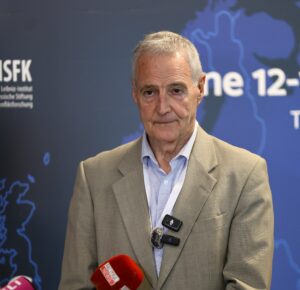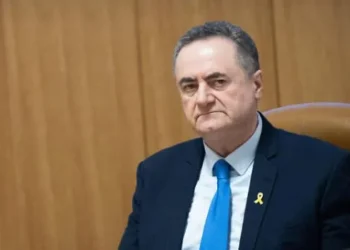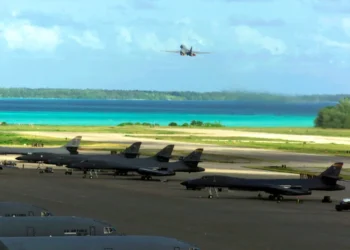Interview by Vazha Tavberidze
Peace through fear, because we have shown that fear works, — that was how Dmitry Medvedev recently summed up Russia’s foreign policy. And while Western leaders often brush off Medvedev’s tirades as the drunken ramblings of a second-tier functionary, his formulation stuck with Professor Michael Clarke, former Director-General of the Royal United Services Institute and one of Britain’s foremost military analysts. In an interview with Radio Free Europe/Radio Liberty’s Georgian Service, conducted during the UGSPN (Security, Policy and Nationalism Research Center) conference at the University of Georgia in Tbilisi on June 13, Clarke lays out how Russia’s war on Ukraine could evolve, how NATO might fail its next test, and why autonomous drones—not tanks—may define the wars to come.
NATO Secretary General Mark Rutte told the British public that ‘you’ll still have the NHS, you’ll still have pensions, but unless you invest 5% of GDP in defense, you’d better start learning Russian.’ Is that narrative device or metaphor? Is it a real threat?
I think Mark Rutte was crafting a soundbite. He’s a clever politician—he wouldn’t have said that accidentally. He knew it was provocative, but he said it for a reason. And it’s entirely reasonable that he should push, ahead of the NATO summit, for Allies to agree on 3.5% as a level of core defense expenditure—5% in total, but 3.5% on actual defense. That would generate, at current levels, about $325 billion, which would add to the $425 billion the Europeans already contribute to NATO. So you’d get a total of around $750 billion, which is comparable to the US defense budget of $850 billion.
So his comment, in a sense, was a reminder that we either make big sacrifices now—or soon—or we end up gifting the Russians influence over our lives. And I don’t think that’s an exaggeration. By “influence over our lives,” I mean: if the Russians succeed in pushing the Americans out of Europe—and I think Trump may just hand that to them on a plate—then the Russians would be able to deal bilaterally with European countries rather than collectively. And they will blackmail and coerce in all sorts of ways. Exactly like the Chinese do. They’ll punish states economically if they say or do something they don’t like.
So when people in Britain say to me, “Well, the Russians aren’t going to invade, are they?” I say, “No, probably not.” But wait until you can’t get money out of the cash machine because satellite communications have been disrupted. Wait until the NHS is in crisis due to a cyberattack. Wait until trains stop running for days on end. Wait until the internet goes down repeatedly. Then you’ll see that living under Russian influence is no fun.
And the Russian message will be the same as Beijing’s: “If you behave in the way we expect, we’ll leave you alone. If you don’t, we’ll punish you.” That’s how Russia operates. They want to be surrounded by weak states—they only feel strong, or secure, when everyone else is weak.
I often go back to Medvedev. I don’t take him too seriously—he’s not in the top tier of decision-makers, and he may well have a drinking problem—but a month ago, he put it very clearly. He said: “NATO talks about peace through strength. We don’t believe in that. We believe in peace through fear—because we have shown that fear works.” And he’s right. Russia has created enough fear—certainly in Germany and parts of Southern Europe—to make itself feel more secure. The Russians will only feel safe when others are afraid of them.

There was also a provocative quote from Ukraine’s former foreign minister, Mr. Kuleba. He questioned whether British mothers would be willing to send their sons to fight for Finland. Are they?
Yes—in the sense that we have a professional army. People sign up knowing what the job entails. We don’t have conscription, and we’re not about to reintroduce it. But we are planning to significantly expand our reserve forces.
Britain has always accepted the possibility of losing service personnel in operations overseas, and I don’t think that will change dramatically. What may change is a mother’s willingness to see her son or daughter join up—or join the reserves in the first place. But, politically, losses have never been toxic in Britain.
So there wouldn’t be widespread public anger about sending troops to, say, Finland?
I don’t think so. I mean, I’m guessing—but, historically, that hasn’t been the case. The British Army is over 360 years old, and we’ve only had conscription for 22 of those years—during the First and Second World Wars. Otherwise, it’s a volunteer force, and there’s a degree of pride in that. People today are more sensitive than previous generations, yes—but I don’t think that losses in a legitimate operation would turn the public against the armed forces, provided the government explains the mission properly.
We didn’t see mass public outrage over losses in Afghanistan, Iraq, or even the Falklands. Kuleba’s broader point wasn’t just about the UK—it was about NATO as a whole. He said if NATO doesn’t respond when, say, Russia seizes some remote village or island, then NATO is finished. Do you agree?
Not finished—but gravely weakened. Let’s say Russia grabs a slice of Estonia or Latvia using the “little green men” approach like they did in the Donbas. That should, in theory, trigger Article 5. If NATO doesn’t respond accordingly, it wouldn’t kill the alliance—but it would be a huge blow. Russia would point to it and say to Southern European members, “See? NATO won’t protect you. They didn’t even act for Estonia.”
And how is that not a killing blow? Doesn’t that irreparably damage NATO’s credibility?
It would be extremely damaging, no question. But NATO would still have its force structure. It might try to work around the failure. Some members would be seen as more “valuable” than others, yes. But then, next time Russia tries it, NATO might say: “Right—we are definitely responding this time, because of what happened last time.”
Still, if Russia tests Article 5 and NATO fails to respond, that’s a serious problem. NATO is a huge alliance—now 32 nations. Originally, it was just 12. Then it was 15, then 16. I think NATO at 16 was very strong. Now, it’s bigger but arguably less powerful, because consensus is harder to reach. It’s more diluted.
Apart from Sweden, Finland, and Poland, most of the new members don’t bring much capability—they mostly add geography and airspace. That’s the reality.
Many Western intelligence services now assess that, in five years’ time, Russia will either attempt or prepare to attack a NATO member—most likely a Baltic state or possibly Finland. Do you agree?
Yes, I think the Russians might well be driven by a sense of momentum—that things are moving their way. And there’s also the clock ticking on Putin himself. He’s 72. He probably figures he has six to eight more years to leave his mark before age catches up with him. He’s a man with a historical mission, a sense of destiny.
So, I don’t necessarily think he wants to conquer another country just to occupy it—though Moldova might be an exception. But breaking NATO: that would be the real legacy he’s after. That would be his contribution to Russia’s “security” when he’s gone. That could mean testing Article 5, driving wedges between Americans and Europeans, and spreading uncertainty and fear across the continent. If, by the time he’s 78 or 79, he can say: “I’ve taken back part of Ukraine, maybe all of it; I’ve moved into Moldova, maybe into Georgia; and look—Europe fears me, the US treats me differently”—then in his mind, he’ll be the greatest Russian leader since Stalin. Or even Peter the Great. “Peter the Great, Catherine the Great, Stalin, Putin.” And that’s what he would want to do. He doesn’t need to hold Estonia or Latvia forever. But if he can do something in the Baltics—or against Finland—that causes political fragmentation in Europe, that’s the real goal.
Say the war in Ukraine ends in a way that’s somewhat favorable to Russia. Putin has his sights on the Baltics for the geopolitical reasons you just mentioned. And there’s Moldova, halfway into the EU already, and Georgia — completely undefended. He might also attempt something in Central Asia, northern Kazakhstan perhaps. Which comes first on the agenda?
It would depend on how the ceasefire in Ukraine came about. If Russia was still gaining ground, they might agree to a ceasefire to consolidate. If, however, they were starting to lose territory — or Crimea was at risk — then they’d want a ceasefire just to avoid further losses. So it really hinges on the context. But if you’re asking about the broader timetable, I’d say think in terms of 2030 to 2032. By 2030, Putin will be 78 — by 2032, 80. That probably acts as a psychological cutoff for him. After that, staying vigorous becomes more difficult.
So say there’s a ceasefire at the end of this year or next — then what? Putin looks around and asks himself: what can I do next to damage the West, to generate fear across Europe? Taking Georgia outright — or Moldova — probably won’t do that. But Moldova has one foot already in the EU. That’s a clock Putin might want to beat.
Exactly. An EU membership timetable could very well influence his own. He might think: I need to act before that window closes. So if he puts Ukraine aside in spring 2026, then by autumn 2027 or spring 2028, we’ll likely see his next move. He won’t just retire to his villa in Sochi. He’ll certainly try something in that 2026–28 window.
If he puts Ukraine aside in 2026, could they not just continue the current war in Ukraine for another couple of years? Given that he’s in the middle of a summer offensive right now?
They’re moving again in the north — in Sumy and Kharkiv — and pushing harder around Pokrovsk and Kostiantynivka. The objective is clearly to take Chasiv Yar, then move on Kramatorsk and Sloviansk. If he captures those, he essentially has the Donbas. That’s what this summer is about.
And once he has that, he goes to the negotiating table?
Maybe. Maybe to please the Americans. But I suspect the Americans will have moved on by then. The Russian offensive is like a sponge, and that cuts both ways. They can’t punch through for a strategic breakthrough. Their structure doesn’t allow it. They’re already on their third army, the first two having been spent. This current army is cobbled together from all over: a month of training, then straight to the front. It’s getting less and less effective. And yet, for Ukraine, attacking this army is like punching a sponge: it just absorbs the blow and reforms. We’re looking at sponge vs. sponge.
So, with that in mind — and I know predictions are a thankless task — how much longer
can Russia maintain this level of warfare?
Not much longer. By the end of this year, things will start to plateau. Their industrial capacity is maxed out — they’ve ramped up production, but now they’re hitting limits. They’re short on components, short on skilled labor. They’re increasingly dependent on imports from Iran, North Korea, and China. If the US were serious about secondary sanctions on China, it could really affect those supply lines.
And if that external help dries up, how much would the tempo drop?
Quite a lot. They’d mostly just sit in trenches and stop advancing. The war would shift fully into a drone war — which, incidentally, Ukraine is starting to dominate. Not in terms of sheer numbers, but in the use of AI to coordinate drones. They’re on the verge of some significant breakthroughs. The Russians will then inevitably catch up to that, obviously. They will adapt. Their drone production has increased tremendously. A lot of them are fakes —decoys—meant to burn through Ukraine’s ammunition. But Ukrainians too are catching up to that; they’ve developed two or three methods for detecting the fakes. So it’s a constant arms race.
The Ukrainians are ahead in key areas. The Russians have learned how to jam Ukrainian drones, but Ukraine’s adapted. Now they send drones part of the way via GPS, and then—once Russian jamming kicks in—the drones switch over to AI and carry on autonomously. They make their own decisions, like kamikaze pilots thinking for themselves. That’s autonomous warfare, and Ukraine is ahead of Russia in that regard.
But Ukrainians still lack in resources to match the sheer volume of Russian output.
Exactly. That’s where the West could step in. Just unfreeze the Russian assets — the $300 billion sitting in Western banks, over $200 billion of it in Europe, mostly in Belgium. Hand it over to Ukraine. Or if that’s too politically delicate, structure it as a long-term loan — payable over 40 years. We did that after WWII. We only finished paying off our war loans in 2015.
But right now, Ukraine doesn’t have the money to buy what it needs — and we’re sitting on a mountain of Russian cash. Yes, it’s legally complicated. But these are extraordinary times. Give them the money.














